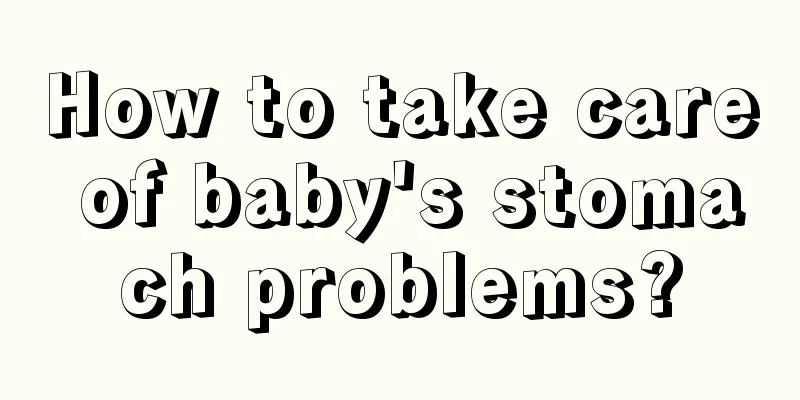What are the symptoms of a baby's stomach upset?

|
When your baby has abdominal distension, poor appetite, constipation, diarrhea or vomiting, it is a sign of gastrointestinal problems. There are many reasons why this happens. If feeding is improper, there will be too many types of food, which will cause the baby's stomach to be unable to digest completely, causing diarrhea. In addition, if the baby catches a cold or the weather is too hot, it may cause gastrointestinal discomfort in the baby. No matter what the cause is, if the baby defecates more than 5 times a day and is accompanied by vomiting and not eating, you should replenish water in time and go to the hospital for treatment as soon as possible. The stomach and intestines are important components of the digestive system. Poor stomach and intestines can directly affect the baby's food digestion and absorption, and have an impact on the baby's physical development. When the baby is young, his ability to express himself is not yet perfect and clear, and he cannot report physical discomfort to his parents in a timely and accurate manner. This requires parents to pay attention to changes in the baby's usual physical condition, discover the disease in time, and take appropriate measures to relieve and treat the baby. The symptoms of gastrointestinal discomfort in babies mainly include the following aspects: (1) Vomiting. Vomiting caused by gastrointestinal discomfort is generally not as severe as vomiting caused by motion sickness and may be ignored by parents. Vomiting caused by gastrointestinal discomfort usually has a sour taste, which is a sign of excessive stomach acid. Sometimes, acid reflux in babies may be an early symptom. (2) Bad breath. Your baby's breath odor becomes bad, especially in the early morning. This is because food accumulates in the stomach and fails to enter the intestines smoothly, causing the smell of food digestion to rise up. When your baby has gastrointestinal discomfort, he should eat small meals frequently to avoid burdening the stomach and intestines with too much food. It is best to feed your baby low-salt, easily digestible liquid or semi-liquid food, which can replenish lost water and the nutrients needed by the body. Under the guidance of a doctor, you can feed some gastrointestinal regulating medicines or powders to enhance your gastrointestinal function. |
<<: What should I do if my baby has a bad stomach and is prone to diarrhea?
>>: What should I do if my baby has poor digestion?
Recommend
How to solve the problem of eye mucus in the corners of newborns' eyes
One thing that many new mothers have experienced ...
Symptoms of bacterial diarrhea in babies
Bacterial diarrhea in babies is medically called ...
Cultivation of children's behavioral habits
We all know that early childhood is the initial s...
How many times a day should a 50-day-old baby poop?
After birth, newborns will defecate almost every ...
What is the standard height and weight for a two and a half year old girl?
Children are the focus of the family from the mom...
How long does the weaning period usually last?
Many mothers who have raised children know that w...
What are the symptoms of formaldehyde allergy in children?
Everyone knows that formaldehyde is a very danger...
How to correct a crooked neck of a four-month-old baby
Many 4-month-old babies have crooked necks, which...
What should children eat when they have a sore throat?
In daily life, autumn and winter are the seasons ...
Is it normal for a child to have a fever of 37 degrees?
As we all know, if the body is relatively healthy...
If your child has blisters on his tongue, these 6 methods are very effective!
Some children have blisters on their tongues, whi...
Can neonatal dacryocystitis heal on its own?
Neonatal dacryocystitis is mostly caused by incom...
What are the hazards of formaldehyde to babies?
Formaldehyde itself is a harmful chemical substan...
What to do if children's skin itches and bulges
When children's skin is itchy and swollen, we...
How long after feeding should the baby take a bath
After birth, whether the baby is fed with breast ...









